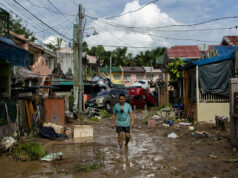Graduating class in coronavirus limbo ponders job prospects

By Jenina P. Ibañez
Reporter
EDWARD R. INCIONG, 23, is one of almost a million graduating students in the Philippines this year anxious about their job prospects amid a novel coronavirus pandemic.
“There’s a feeling of uncertainty,” the civil engineering student from De La Salle University in Manila said in a Zoom video interview. “We don’t know if companies will accept interns after the quarantine.”
President Rodrigo R. Duterte locked down the entire Luzon island for two months until May 15, suspending work, classes and public transportation to contain the outbreak that has sickened over 8,000 and killed at least 500 people locally.
People were told to stay home except to buy food and other basic items, while a number of companies were forced to shut unless they belonged to “essential” sectors such as health care and food.
The class of 2020 has been submitting schoolwork online and graduation ceremonies have been postponed in the absence of a cure for the coronavirus disease 2019 (COVID-19) virus.
Once the lockdown is relaxed, fresh graduates will try to enter a job market marked by unemployment, as a number of companies try to reopen and stay afloat.
Arvin M. Ramos, a job recruiter at Manila Recruitment, said many of their client companies have stopped hiring.
“Business leaders have become more conservative about making decisions because of the uncertainties brought by the pandemic,” he said by Zoom.
Mr. Ramos said conservative hiring will be felt most in tourism, manufacturing, retail, entertainment and construction.
The National Economic and Development Authority said as many as 1.8 million local jobs could be lost because of the pandemic.
The International Labour Organisation (ILO) on March 18 said up to 25 million jobs could be cut globally this year. The number could be significantly higher, it said less than a month later.
IMMEDIATE EFFECT
Workplace disruptions caused by the COVID-19 pandemic could wipe out labor equivalent to the effort of 195 million full-time workers, or 6.7% of hours clocked worldwide in the second quarter, the ILO said.
Felix Weidenkaff, ILO East and Southeast Asia and the Pacific employment specialist, said this health crisis is different because the effect on global employment is immediate.
“Usually, employment adjustment follows economic contraction with some delay,” he said in a Zoom video interview. “Those full or partial lockdown measures are now affecting almost 2.7 billion workers globally, representing around 81% of the world’s workforce.”
The employment downturn will hurt young people vulnerable to falling labor demand, Mr. Weidenkaff said.
“In the case of new university graduates who enter the labor market, securing employment and a smooth transition into decent work is already a pressing challenge in itself,” he said.
Even during economic upswings, young people who enter the labor market find it difficult to find jobs that match their education. Previous recessions show how young workers will be particularly affected by the economic fallout caused by the pandemic, he added.
“As businesses are confronted with difficult decisions on how and who to keep, young workers are often the first ones to be released or face a reduction in working hours,” Mr. Weidenkaff said.
Beatrice Grace V. Berida, a 23-year-old visual communications senior at the University of the Philippines (UP), is worried about the competition.
“We might be going against a lot of people with experience and those who have been laid off,” said the graduating student who wants to work for a design start-up.
Manila Recruitment’s Mr. Ramos noted that as the economy stabilizes, companies are more likely to rehire employees they had laid off instead of hiring new ones.
“When large corporations start to hire, the people that they’ll be hiring would be people with years of experience already,” he said. “Companies don’t have the time to train people. That puts fresh graduates at a disadvantage.”
Most micro, small, and medium-sized enterprises focused on recovering from losses would not be hiring at all, Mr. Ramos said.
Some business graduates may still find work. Multinational companies might continue hiring, though delayed, he said.
FREELANCE JOBS
Theriza T. Quiambao, who graduated with a double major in Development Studies and Management of Financial Institutions from De La Salle University in February, said her job applications were pending.
She started applying for management trainee jobs at several multinational companies just before the lockdown.
“I was supposed to have an in-person interview, but we were overtaken by the lockdown so they made it virtual instead,” she said by Zoom.
Hanna D. Laurel, vice-president for external affairs at UP’s career assistance program, said a couple of companies pulled out of the university’s online career fair because they were uncertain about hiring.
“Some of them were already sure about recruiting but not until next year. They’ve changed their calendar,” she said.
Mr. Weidenkaff said young people, older workers, women, informal workers and migrants are particularly vulnerable during the health crisis.
“The outlook is highly uncertain,” he said. “There’s a likelihood that the eventual increase in global unemployment over 2020 might be higher but it will depend on how quickly the economy will recover and how effectively policy measures will boost labor demand.”
Mr. Ramos said fresh graduates should upskill and take on freelance jobs to gain experience, noting that e-commerce, online teaching, telemedicine and financial services may continue to hire workers as businesses shift to a “new normal.”
In an economy where social distancing is the norm, jobs in digital marketing and information technology will be in high demand, he said.
Rafael C. Adasa, a 24-year-old production design major at the De La Salle College of Saint Benilde, was supposed to go to Australia to study prosthetic arts.
Travel restrictions might keep him in Manila, where there are fewer jobs in an entertainment industry frozen by the lockdown.
“I don’t have any idea what will happen. It’s hard,” he said.



